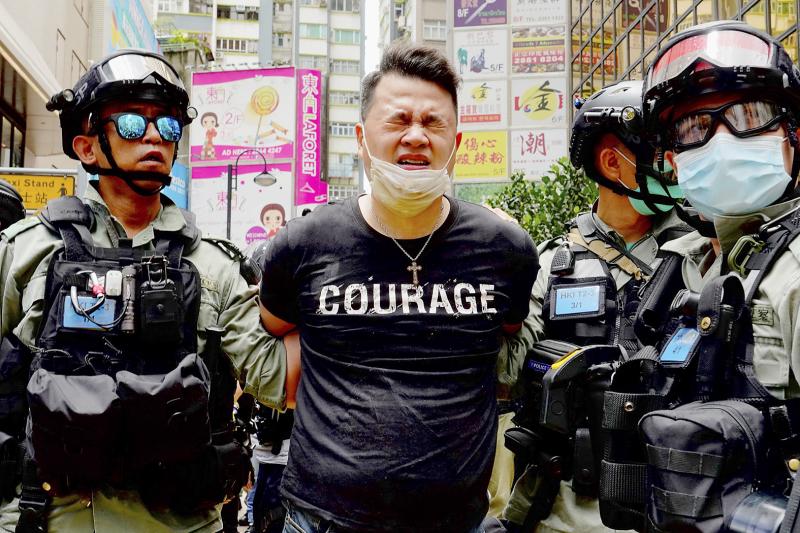Hong Kong police yesterday made their first arrests under a new national security legislation imposed a day earlier by China’s central government, detaining at least seven people suspected of breaching it during protests by thousands of people.
One man with a Hong Kong independence flag was arrested at a protest in the territory’s Causeway Bay shopping district, police said.
Police arrested another woman for holding up a sign displaying the British flag and calling for Hong Kong’s independence.
Three other women were detained for possessing items advocating independence.
Further details were not immediately available.
Hong Kong police wrote on Facebook that they arrested more than 180 people on various charges, including unlawful assembly, possession of weapons and breaching the national security legislation.
The arrests came as thousands of people took to the streets in an anti-government protest on the 23rd anniversary of Britain’s handover of Hong Kong to China in 1997.
For the first time, police banned this year’s annual march.
Protesters shouted slogans, lambasted police, and held up signs condemning the Chinese government and the new security legislation.
The legislation, imposed by China after pro-democracy protests in the territory last year, makes secessionist, subversive or terrorist activities illegal, as well as foreign intervention in the territory’s internal affairs. Any person taking part in secessionist activities, such as shouting slogans or holding up banners and flags calling for the territory’s independence, is contravening the legislation, regardless of whether violence is used.
The most serious offenders, such as those deemed to be the masterminds behind the crimes, could receive a maximum punishment of life in prison. Lesser offenders could receive jail terms of up to three years, short-term detention or restrictions.
Hong Kong Chief Executive Carrie Lam (林鄭月娥) endorsed the new legislation in a speech marking the handover of the territory — officially called the Hong Kong Special Administrative Region (HKSAR) — from British colonial rule.
“The enactment of the national law is regarded as the most significant development in the relationship between the central authorities and the HKSAR since Hong Kong’s return to the motherland,” Lam said, following a flag-raising ceremony and the playing of China’s national anthem.
A pro-democracy political party, the League of Social Democrats, organized a protest march during the flag-raising ceremony.
About a dozen participants chanted slogans echoing demands from protesters last year for political reform and an investigation into accusations of police abuse.
Claudia Mo (毛孟靜), an opposition Hong Kong lawmaker, told a news conference that the security legislation does not abide by the rule of law and is a dire warning to the free press.
“This would tell you that they want not just to get us, but to intimidate us into inaction, into a catatonic state,” Mo said.
Meanwhile, British Secretary of Foreign and Commonwealth Affairs Dominic Raab announced that residence rights for Hong Kongers eligible for British National Overseas (BNO) passports would be extended to five years.
Raab told the House of Commons that the new rules would allow more than 3 million Hong Kongers the right to live and work in Britain without the current six-month limit.
After five years in the UK, BNO passport holders could apply for settled status and then apply for citizenship 12 months after that.
Source: Taipei Times - 2020/07/02





















